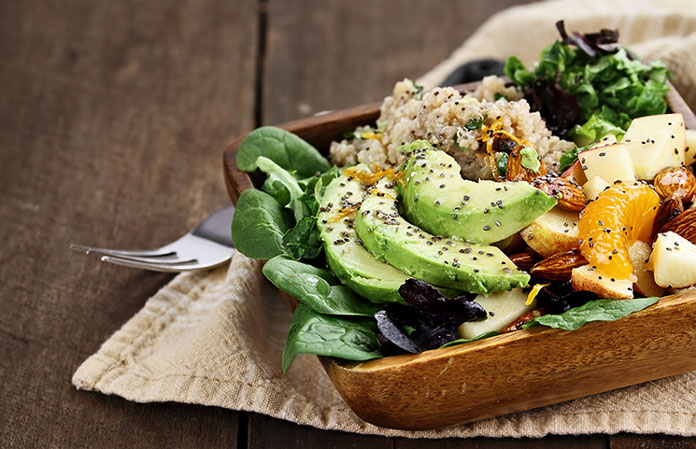Healthy foods can help improve the symptoms that are associated with depression. The best mood stabilizing food plan should comprise plenty of fruits, whole grains, nuts, vegetables, and foods that are high in omega-3 fatty acids.
According to the dietary recommendations for depression that was published in 2015, processed and packaged foods should be excluded from the dietary plan. Health experts recommend the consumption of lean meats, whole grains, and fruits on a daily basis to help improve both mental and physical health.
Studies have shown that the body responds to different foods in different ways. Foods such as bread and pasta which are full in carbohydrates can leave one feeling bloated and even in a bad mood.
Studies have revealed that a poor mood also interferes with the performance of the immune system. A poor mood is also associated with slow weight loss and even tension headaches.

This article is about a list of 12 of the healthy foods that will help boost your mood.
12 Best Health Foods To Boost Your Mood & Energy To Boost Your Mood:
1. Chicken And Turkey
Chicken and turkey breasts are great mood-stabilizers. It provides the body with amino acids, such as tryptophan. Tryptophan is required for the production of serotonin. Serotonin plays a vital role in the regulation of your mood. Serotonin participates in the synthesis of the melatonin hormone, which is involved in the regulation of sleep.
Besides tryptophan, lean poultry also contains tyrosine. Studies have shown that tyrosine can help improve symptoms that are associated with depression. Low levels of the adrenaline hormone have been linked to depression. The body utilizes tyrosine in the synthesis of the adrenaline hormone.
2. Spinach
Depression can be caused by the lack of nutrients, such as Vitamin B, in the body. Vitamin B is needed for the synthesis of serotonin. The B vitamins that are involved in the regulation of mood include Vitamins B3, B6, and B12.
These vitamins can be sourced from eating leafy green vegetables, such as broccoli and spinach. Eating one cup of spinach provides the body with about 30 percent of recommended daily allowance of the B vitamins. Spinach can be added to stir-fry and soups. It can also be used to make a salad.
3. Bananas
Bananas are rich in several nutrients such as Vitamins A, B6, and C. Bananas are also high in the amino acid tryptophan, which plays a key role in mood regulation. Other nutrients that are found in bananas include potassium, phosphorus, iron, and carbohydrates. Carbs help boost the mood by aiding the absorption of tryptophan in the brain.
Vitamin B6 is also a great mood-stabilizer, and it acts by stimulating the conversion of tryptophan into serotonin, which is also a mood-stabilizing hormone.
The production of serotonin helps to boost the mood as well, and is also known to improve symptoms associated with insomnia. Tryptophan has been used as a therapeutic agent to treat various conditions such as anxiety, depression, and insomnia or lack of sleep. One medium-sized banana can be eaten in the morning to provide the body with the nutrition needed to make it through the day.
4. Grapes
Juicy grapes are good for individuals who want to improve their mood and feel better. Grapes are high in several nutrients and antioxidants. The most abundant antioxidants that are present in grapes are flavonoids. Studies have revealed that flavonoids play a significant role when it comes to mood stabilization.
Although red wine, which is made from grapes, contains flavonoid antioxidants, it is not advisable to depend on it as the primary source of the antioxidants because alcohol is generally known as a depressant.
It can worsen the symptoms that are associated with having a bad mood. It is advisable to eat the grapes in their natural state to benefit the most.
5. Avocados
The benefits of avocados to mental health are outstanding, which is why avocados are mentioned on almost every healthy eating list. The superfood has several health benefits, such as protecting the cardiovascular system from potential disorders. Avocados are also known to promote the performance of the digestive system.
Avocados are also an excellent option for improving a bad mood, and they act by balancing the hormones that are involved mood and emotions. Avocados work in the central nervous system by ensuring that the brain is making the right hormones that are required to improve one's mood.

6. Salmon
Health care providers recommend wild-caught salmon as one of the best foods to improve both your mood and your mental health. Salmon provides the body with twice the required daily allowance of Vitamin B12. The vitamin plays a crucial role when it comes to improving one's mood and making them feel better.
A study found that individuals with high levels of Vitamin B12 were more successful in dealing with symptoms associated with depression, such as anxiety, fatigue, and lack of sleep. Wild-caught salmon is also rich in essential fatty acids that take part in mood stabilization. The essential fatty acids influence the brain to synthesize the right mood-stabilizing chemicals.
7. Shiitake Mushrooms
Besides its pleasant taste, the shiitake mushroom has a lot to offer. The Asian mushroom contains various nutrients and minerals, and the most abundant nutrient in the mushroom is Vitamin B. The vitamin, also known as pyridoxine, is critical to ensure that the physical and physiological functions of the body are properly maintained.
The vitamin is also vital in providing mood stability and a general good feeling. The vitamin is involved in the synthesis of serotonin and neurotransmitters. Vitamin B6 is also used therapeutically in the management of mood disorders, such as depression. The shiitake mushroom can even be eaten with meat-free meals.
8. Lentils
Lentils are known as complex carbohydrates and have a similar activity to bananas when it comes to mood stabilization. Lentils act by promoting the synthesis of hormones that help stabilize the mood. Individuals who eat lentils on a regular basis have higher levels of the hormone serotonin in the body. Besides being a mood stabilizer, lentils are also known as stabilizers of blood sugar levels.
Lentils are also high in folate. The lack of folate in the body has been associated with mood disorders, such as depression and mania. Lentils can also help improve the levels of iron found in the body. Lentils can be eaten with homemade stew or soup. They can be soaked in water for some time before cooking to make them more easily digestible.
9. Water
Water plays various roles in the human body. A lack of water in the body can impair the physical and mental health of an individual. Dehydrated persons can hardly concentrate. One study found out that the greater the amount of water consumed, the better the mood of a person. Symptoms such as tension, anxiety, and depression reduces when the consumption of water is increased.
According to the U.S. Institute of Medicine, a mild dehydration during the day can lead to severe mood changes. The effect is more common among women. Studies have also revealed that when body fluids are lowered through exercising or drinking too much caffeine, the affected person becomes dehydrated, and this affects the mood and the general body health.
Studies have also shown that drinking water can help alleviate depression and sleep disorders, such as insomnia.
According to a study that was conducted by scientists from the University of Connecticut, dehydrated individuals usually appear fatigued. Inadequate intake of water can cause confusion, fatigue, and sleepiness. It is advisable to drink plenty of water during a busy day to avoid depression and mood changes. Health care experts recommend the intake of at least one liter of water per day.
10. Dark Chocolate
Studies have confirmed that eating dark chocolate also has benefits to the brain. Chocolate has been shown to improve both mood and memory. Studies examining the impact of dark chocolate on health have revealed that its consumption can contribute to improving both cognitive function and mood.
Chocolate contains flavonoids and methylxanthines, which play a role in chocolate's effects on mood. Several studies have confirmed the positive impact of dark chocolate on both mood and cognitive function.
A study found out that subjects who consumed dark chocolate remained calmer and more content over an extended period. Dark chocolate is rich in polyphenols, which help improve the mood. The subjects who were given placebo chocolate did not experience any changes in their moods.
Chocolates that are high in polyphenols have been shown to improve depression and anxiety in an affected individual. The natural compounds that are contained in chocolate have also been found to improve both learning and memory.
11. Strawberries
Strawberries are packed with several nutrients, such as Vitamins A and C. They are also a great source of manganese. The vitamins that are present in berries provide it with antioxidant properties and help protect the brain from degeneration.
Strawberries also promote the production of the mood-stabilizing hormones from the brain.

12. Oysters
Oysters have several health benefits to the brain. Oysters are rich in minerals, such as zinc, which is crucial for the development and performance of the brain. Patients who have been diagnosed with depression usually have low zinc levels in the body.
Oysters also contain proteins that are made of tyrosine amino acid. The amino acid plays a significant role in the elevation of mood and energy levels.
Best Health Foods For Mood Energy Depression Summary
There are plenty of foods that can be utilized as a mood stabilizer. They include spinach, which is high in vitamins, such as Vitamin B and C.
Brussels Sprout is also high in vitamins and can help one achieve their health goals.









